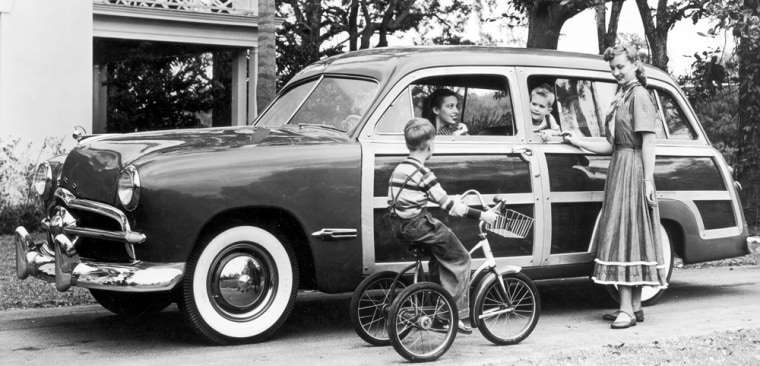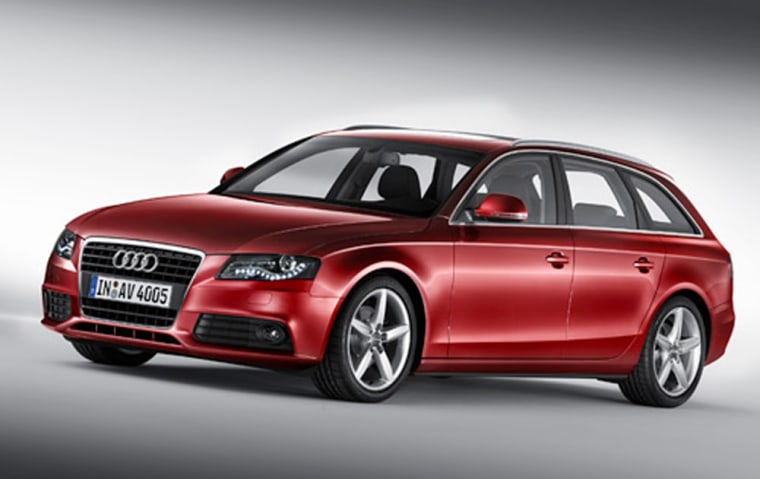Recent announcements from General Motors and Chrysler about their plans to drop several models and brands didn't seem to hinder Cadillac's resolution to press forward with the launch of its first-ever station wagon.
The Cadillac CTS Sport Wagon, due out in May, is essentially the brand's successful CTS sedan, but with additional cargo space. Cadillac reps say they're catering to luxury-minded buyers who want to downsize while maintaining practicality.
"We think the newness of it and the sort of times in which we're living, it seems like the right car at the right time and the right size," says David Caldwell, a spokesman for Cadillac.
Cadillac isn't alone. The car market has a surprising amount of new luxury station wagons. And these upscale wagons don't all have luxury prices.
There are 17 new 2009 models on the market that are true wagons, ranging on the high end from the $88,500 Mercedes-Benz E63 AMG to the $55,800 BMW 535i xDrive Sports Wagon. And there are several lifestyle-oriented brands with new wagons at the lower end of the price spectrum as well, such as the $22,295 Subaru Outback and the $29,800 Volvo V50.
The wagon's heyday was the late 1950s, when American-made models like the AMC Rambler, Ford Country Squire and Oldsmobile Vista Cruiser ruled the market. In the span of a decade, sales rose from about 3 percent in 1950 to almost 17 percent of the U.S. auto market, before they fell in the 1970s and '80s, largely due to the minivan and rising gas prices. Wagons now command about 1 percent of the national market.
Tim Cleary, president of the American Station Wagon Owners Association, owns three vintage station wagons. Their style (metal fins and recessed front lights) and function (space in the back to store a 4-by-8-foot piece of plywood and a swinging tailgate) made wagons an irresistible combination for families and 20-somethings alike.
"It started as a hot-rod thing," Cleary says. "California is always a trend-setter, and California always had the most station wagons. They were used by not just families but by surfers, so they became a cool car out there."
Today's models are, essentially, already-proven sedans, just stretched out a bit. The Audi A6 avant, for example, includes everything a regular Audi does: a sunroof, a Quattro all-wheel drive system, adaptive headlights, heated front seats and multiple airbags — all standard. But this isn't a sign that wagons are going to become a big slice of the auto market again, the way they were a few decades ago.
The reason for this, says Jeff Schuster, executive director of forecasting for J.D. Power and Associates, is that the sudden popularity of the crossover — SUV amenities built on a car chassis — has stymied any chance of the wagon's growth.
"I think, generally speaking, the CUV, the luxury CUV, has replaced the station wagon for the most part," Schuster says. "I just don't think there's enough volume to support a lot of product in this area."

But to hear the automakers tell it, crossovers and wagons are not redundant. Many luxury automakers offer both wagon and crossover variants, Cadillac being one of them.
Wagons fared better than other segments when the economy took a nosedive. Volvo's V50 sales, for instance, dropped 16.6 percent in January from a year earlier; but its XC90 crossover fell 70.1 percent, and its S60 sedan fell 83.9 percent. BMW's 328i wagon sales fell 37.5 percent — just less than the average decline in U.S. car sales in January, which was 38.3 percent.
Some experts say wagons will be a mainstay of the auto industry, but they won't always be called wagons per se. Toyota, for one, sells vehicles suspiciously similar to station wagons but not labeled as such, like its new Venza.
"With the station wagon, the imagery right now is old and boring if you ask customers to describe what a station wagon means," says Tim Barnes, director of product planning and strategy at Mazda. The company discontinued its Mazda6 wagon in North America in 2008.
"We'll probably never call it a station wagon again," Barnes says. "It will be something different, but it will be kind of a blend between an SUV and a more utilitarian sedan. There's still a lot of baggage with that name."
BMW's Matt Russell is cautiously optimistic about wagons' future, adding that BMW could produce more "sporty" wagon options should the market head that direction. "We might be able to take such steps to make the wagons even more attractive" in terms of improving efficiency while maintaining performance, he says.
Given the depths to which the auto industry has sunk, even that sliver of confidence bodes well for the humble wagon.
